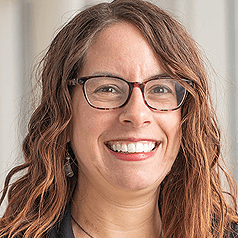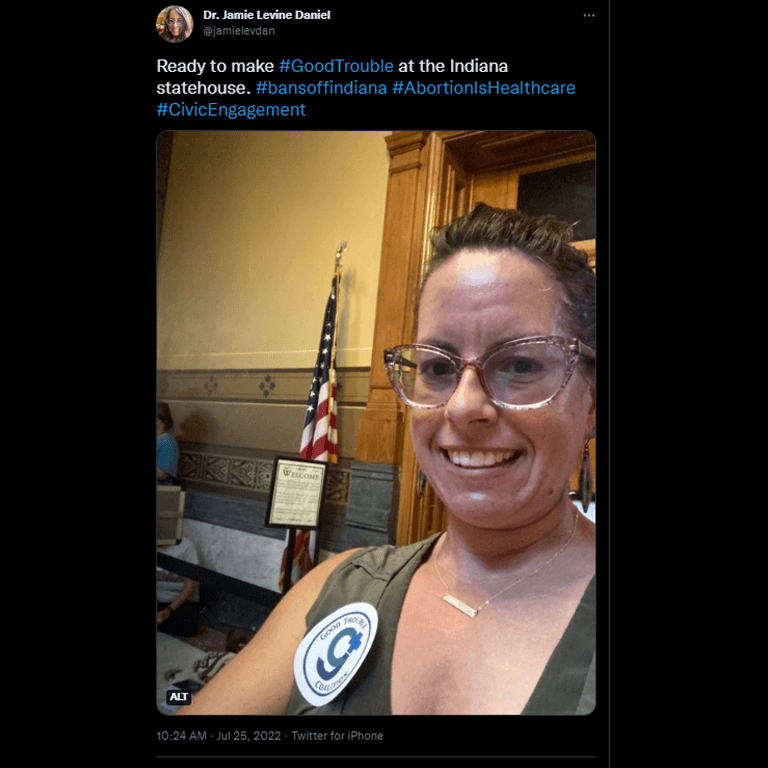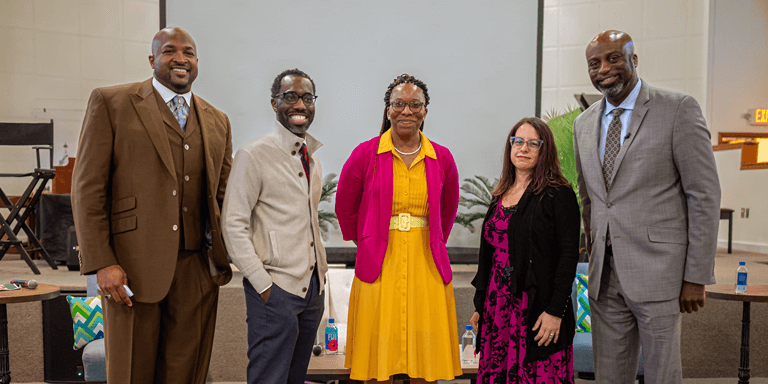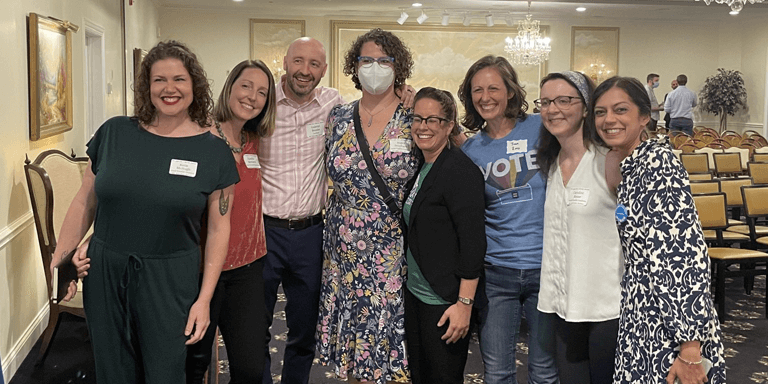
Dr. Jamie Levine Daniel, Ph.D., is an associate professor at the Paul H. O’Neill School of Public and Environmental Affairs at Indiana University-Purdue University Indianapolis. Her research interests include nonprofit capacity, nonprofit finance, organizational identity, and public service delivery. Her initial focus on addressing antisemitism in the classroom led her to a broader research focus on equity and justice in process, policy, and process that involves knowledge co-creation with community partners.
Dr. Levine Daniel has a strong commitment to teaching her students how to demonstrate cultural competency and gain valuable communication and analysis skills that can be used beyond the classroom. She strives to provide inclusive environments for her students to feel comfortable in the growing and learning processes.
In her free time, Dr. Levine Daniel enjoys spending time with her husband, child, and pet dog. She often watches the English Premier League and Cleveland, Ohio sports. And, she loves to bake, run, practice yoga, and crochet.

Our students and community leaders need to be able to demonstrate cultural competency and humility, critique technical rationality, and demonstrate ethical approaches to power.
Dr. Levine Daniel



(Left Photo) Dr. Jamie Levine Daniel at the Statehouse in July 2022 as part of the Good Trouble Coalition; (Top Right Photo) Panel from "Common Grounds Cinematic Conversations: The Enduring Legacy of the Plantation" at Spirit and Place 2021; (Bottom Right Photo) the Good Trouble Coalition steering committee at an advocacy event
Q and A with Dr. Levine Daniel
My interest in nonprofits started with a very narrow focus: the connection between nonprofit resource acquisition and service delivery. I was specifically interested in earned revenue – how to examine it as it connects to nonprofit mission and service delivery, not just as an abstract concept.
I examine questions of power and equity in process, policy, and politics. This speaks to both my research and my teaching philosophy. Nonprofit leaders, employees, and volunteers need to be able to demonstrate cultural competency and humility, critique technical rationality, and demonstrate ethical approaches to power. Examples include:
- Incorporating discussions of Othering into the classroom
- Dismantling institutionalized and structural racism in philanthropy
- Tracking cross-border philanthropy
- Advocating for patient-centered care, public health, and health equity
With reference to the above projects, examples include:
A. Incorporating discussions of Othering into the classroom
a. Giving talks and trainings to organizations such as the National Association for Social Workers
B. Dismantling institutionalized and structural racism in philanthropy
a.Capturing efforts already in place, developing means of measurement (qualitative and
C.Tracking cross-border philanthropy
a.Tracking over $1.8 billion of a reported $2.6 billion in cross-border donations from specific US INGOs to Israeli-based NGOs.
D. Advocating for patient-centered care, public health, and health equity
a. Co-founding a new nonprofit with over 1200 members – directly lending my expertise in nonprofit organization and management
b. Published 2 co-authored op eds in the Indy Star
c. Crowdfunded a $20,000+ ad buy to publish an open letter for reproductive rights signed by over 1300 healthcare and public health professionals – this letter appeared in 8 papers across Indiana
d. Mobilized a (currently ongoing) campaign to pressure Health and Hospital Corporation to drop the petition it currently has before the Supreme Court
e. All since mid-June 2022
I love the moments I can make my research resonate in ways people can access – community presentations, op eds, things like that.
I also love the “aha” moments of realizing a question, paper, project, or idea from years ago that I thought was completely unrelated to my current work is actually part of the foundation underpinning my current work. It’s like finding a long-lost puzzle piece to complete a picture.
For example, as I will discuss in my talk, the projects that I thought were one-offs, or narrowly focused – the antisemitism paper over there, the earned revenue paper over there…. when looked at with a broader lens, with the benefit of time, I can clearly see a coalescence around questions of power and equity.
I have co-authored with students, and we have two doctoral students (one from IUPUI, one from Ohio State) on our research team for our justice philanthropy project.
Community members are co-creators of much of the Justice Philanthropy Project – helping us design and refine instruments like interview protocols.
This is a multi-year, multi-site study, so community members are also accountability partners. They participate in our interviews and we are responsible for providing reports on findings and getting feedback for continuous improvement.
I have also co-authored op eds with community members to encourage advocacy for science-based policies here in Indiana.
The cross-border philanthropy project remains ongoing – we have a 10-year longitudinal study planned to (attempt to) assess general and COVID-specific changes and impacts on this type of giving.
After spending approximately a year observing an aligned action network of community foundations attempting to dismantle racism in philanthropy, we recently launched phase one of our multi-year/multi-site project. So this is more of a “current and next steps”, but will certainly be our focus for the foreseeable future.
Other than that, I truly cannot guess what is next, because a few years ago I never would have envisioned myself here. I look forward to seeing where this takes me.
Conversation with Dr. Jamie Levine Daniel
On Friday, December 16, 2022 from 12 noon to 1:00 p.m., Dr. Jamie Levine Daniel talked about “Addressing Inequity and Othering in our Classrooms and Communities.” Dr. Jamie Levine Daniel discussed the need to acknowledge, address, and mitigate bias in order to best serve our communities. She highlighted how her initial focus on addressing antisemitism in the classroom led her to a broader research focus on equity and justice in process and policy that involves knowledge co-creation with community partners. Examples she highlighted include dismantling racism in philanthropy, tracking cross-border philanthropy, and advocating for science-based health policy.
Interested in Becoming an IUPUI TRIP Scholar?
Eligibility
IUPUI faculty member conducting translational community-based research
Benefits
- Valued member of an extensive network of researchers/collaborators
- Opportunities to showcase work
Subscribe to the TRIP Scholars of the Month

